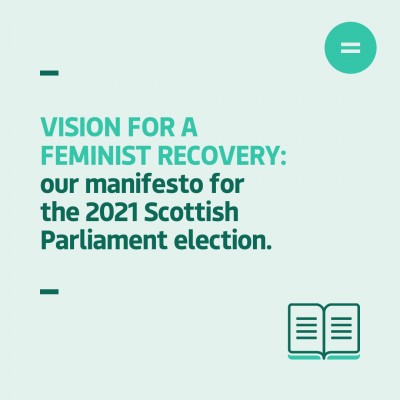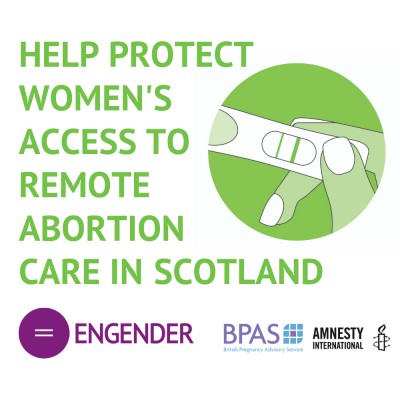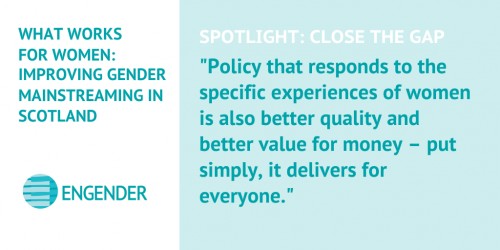Engender blog
All of Engender’s latest news. Reports, reviews, books, articles, and information from across Scotland’s women’s sector.
We would love to hear from other feminists around Scotland. Check out our guidelines for more information on how you can blog for us.
Engender launches Vision for A Feminist Recovery Manifesto for Holyrood 2021

Today Engender has launched Vision for a Feminist Recovery, our manifesto for the 2021 Scottish Parliament election.
We advocate for a Scotland where women are part of every political and economic decision, both as decision-makers and as citizens who share equally their consequences.
This includes understanding the complexities of all women’s lives and impacts of multiple and intersecting discrimination for Black and minority ethnic women, younger and older women, disabled women, lesbian, bisexual and trans women and women from rural communities as well as women who are mothers, women who have experienced domestic abuse or men’s violence, and women who experience poverty among other nuanced and multifaceted realities.
In 2017 Engender published our Gender Matters Roadmap, created in consultation with women from across Scotland.
It sets out a series of measures that, with political will, can be taken by the Scottish Government and other bodies in order to move towards women’s equality in Scotland by 2030. It describes a Scotland with the following features:
- Women’s rights are realised regardless of ability, race, sexual orientation, gender identity, age or background;
- Women and their children are safe and secure from harm;
- Women have equal access to resources and opportunities;
- Women have equal influence in political and economic life;
- Women are able to participate fully in society and culture;
- Women and women’s unpaid and paid work are valued;
- Diverse groups of women are at the forefront of the women’s movement.
This manifesto describes the steps we believe necessary to take us closer to that 2030 vision over the next parliament.
However, the 2021 elections come at an extraordinary point in our collective history. The tragedies seen over the past months as Scotland and the world responded to the
Covid-19 pandemic have, and continue to have, significant impacts for women’s wellbeing. Lockdown and an as-yet-unknown scale of economic recession have disrupted women’s support networks, such as childcare, and made their livelihoods more precarious. This crisis will inevitably extend its reach across the next parliament.
Reaching our 2030 vision for a gender equal Scotland is not impossible, despite Covid-19. Deliberate and urgent action is required now. We call on Scotland’s political parties to stop women’s equality being set back and support these ambitions to realise a more equal Scotland within this decade.
Read the full Vision for a Feminist Recovery manifesto online here.
Our Bodies Our Rights in Lockdown
In this blog, Engender's Policy and Parliamentary Manager Eilidh Dickson, discusses the Our Bodies Our Rights report, the impact of the Covid-19 pandemic on disabled women, and our new survey developed with People First Scotland.
-400.png)
This month represents an anniversary nobody could have previously imagined as we mark a year since the first Covid-19 cases in Scotland and the transition into the first national lockdown on the 23rd March 2020. Even in those early weeks, Engender highlighted how Covid-19 and the public health measures necessary to save lives would impact on women, from access to decision-making to mental health of unpaid carers and frontline workers in health and social care and to increased childcare and home-schooling making it even harder for women to combine paid and reproductive work.
Women have shared their diverse but often deeply distressing stories with us through our Women Covid Scot page, all too often describing the risks of working on the frontlines; fear of careers disrupted or derailed and the toll of balancing paid work, mounting domestic work and home-schooling with limited support from employers or partners, cut off from their external support networks. UN Women has estimated that the pandemic could set back global progress on women’s rights back by 25 years.
In March 2020 Engender was also preparing to host an event at the Scottish Parliament reflecting on a year since the launch of our Our Bodies Our Rights Report which examined the barriers to disabled women's reproductive rights in Scotland. This project saw us speak with disabled women across Scotland to hear about their experiences of puberty, sex education, relationships, family planning, maternity services, parenting support and the menopause. Policy and practice across healthcare, education, justice and social care, among many other public services, was found to ignore disabled women’s needs.
Engender recommends 2020
Over the past years we've had to privilege of chatting to some brilliant women for our On the Engender podcast. This year, we asked guests to leave us with a recommendation - from further policy reading, to must-follow twitter accounts.
Here's what's been recommended in 2020:
Have your say on the future of remote abortion care in Scotland

One of the (very) few positives from this year has been seeing how, when pushed, changes can be made to make people's lives easier. Workplace flexibility which disabled people's organisations have been demanding for years, priority shopping times for older people or those who experience sensory overload, and massive efforts to provide accommodation for those in need.
One of those changes has been a shift in how women (as well as trans men and non-binary people) have been able to access abortion care. We saw the start of this change back in 2017 when the Scottish Government enabled women to take one of the two pills needed to have an abortion (mifepristone and misoprostol) at home. This was already a big improvement for women, meaning they didn't need to travel to a clinic twice in a few days, with all of the childcare, work arrangements, travel costs and other inconveniences that created.
Guest Post: Mainstreaming Spotlight - Close the Gap
To mark the release of Engender's new report, What Works for Women: Improving gender mainstreaming in Scotland, we're sharing how mainstreaming is important to the work of some of Scotland's equalities organisations. Here, Lindsey Millen from Close the Gap talks about how mainstreaming is essential for their work on women's labour market participation.

Why is gender mainstreaming important to your organisation?
Gender mainstreaming is critical to delivering women’s labour market equality and, in doing so, tackle wider gender inequality. Many of the causes of the gender pay gap are not unlawful, e.g. the lack of quality flexible working at senior levels and a lack of affordable wraparound childcare. In order to tackle these issues, gender must be at the heart of policymaking. Policy that responds to the specific experiences of women is also better quality and better value for money – put simply, it delivers for everyone. Gender mainstreaming is such a valuable tool for policymakers and we need to see it being used effectively.
What area(s) of mainstreaming are you focused on?
Close the Gap works on women’s labour market inequality, which includes policy advocacy and employer engagement. The Scottish-specific duties of the public sector equality duty (PSED) are a big focus for us as they require public bodies to mainstream gender across all of their functions. We are interested in how public bodies are using their gender pay gap, occupational segregation and employment data to do gender mainstreaming. This supports our work to advocate for a duty that delivers for women and has formed the basis for our employer guidance on PSED and the work we do to support individual public bodies to improve their compliance.
If you could snap your fingers and change one thing to make gender mainstreaming happen, what would it be?
It is difficult to pick just one thing and there are really three things that have to work in concert in order for gender mainstreaming to happen. Firstly, public bodies need support to develop their understanding of gender inequality and how this relates to the work they do. Without this it’s difficult to develop good quality solutions. Secondly, we need to see real accountability for public bodies to ensure gender mainstreaming is done – and done well. Thirdly, we need leadership at the most senior levels of public bodies that makes clear gender mainstreaming is a core part of their work as public service providers, employers, and in their other roles.
Where can people find out more about your work on mainstreaming?
A good place to start would be our assessments of public bodies’ performance of the duties – here and here. Public sector employers (and PSED geeks) will find our guidance helpful in developing their work on gender mainstreaming and the duties in general – this can be found here. Gender mainstreaming is woven throughout our work – there’s plenty of other content to be found on our website.Downloads
 Engender Briefing: Pension Credit Entitlement Changes
From 15 May 2019, new changes will be introduced which will require couples where one partner has reached state pension age and one has not (‘mixed age couples’) to claim universal credit (UC) instead of Pension Credit.
Engender Briefing: Pension Credit Entitlement Changes
From 15 May 2019, new changes will be introduced which will require couples where one partner has reached state pension age and one has not (‘mixed age couples’) to claim universal credit (UC) instead of Pension Credit.
 Engender Parliamentary Briefing: Condemnation of Misogyny, Racism, Harassment and Sexism
Engender welcomes this Scottish Parliament Debate on Condemnation of Misogyny, Racism, Harassment and Sexism and the opportunity to raise awareness of the ways in which women in Scotland’s inequality contributes to gender-based violence.
Engender Parliamentary Briefing: Condemnation of Misogyny, Racism, Harassment and Sexism
Engender welcomes this Scottish Parliament Debate on Condemnation of Misogyny, Racism, Harassment and Sexism and the opportunity to raise awareness of the ways in which women in Scotland’s inequality contributes to gender-based violence.
 Gender Matters in Social Security: Individual Payments of Universal Credit
A paper calling on the Scottish Government to automatically split payments of Universal Credit between couples, once this power is devolved to the Scottish Parliament.
Gender Matters in Social Security: Individual Payments of Universal Credit
A paper calling on the Scottish Government to automatically split payments of Universal Credit between couples, once this power is devolved to the Scottish Parliament.
 Gender Matters Manifesto: Twenty for 2016
This manifesto sets out measures that, with political will, can be taken over the next parliamentary term in pursuit of these goals.
Gender Matters Manifesto: Twenty for 2016
This manifesto sets out measures that, with political will, can be taken over the next parliamentary term in pursuit of these goals.
 Scottish NGO Briefing for UN Special Rapporteur on Violence Against Women
Joint briefing paper for the UN Rapporteur on Violence Against Women.
Scottish NGO Briefing for UN Special Rapporteur on Violence Against Women
Joint briefing paper for the UN Rapporteur on Violence Against Women.

Newsletter
Sign up to receive our newsletter here:
Sign up to our mailing list
Receive key feminist updates direct to your inbox: